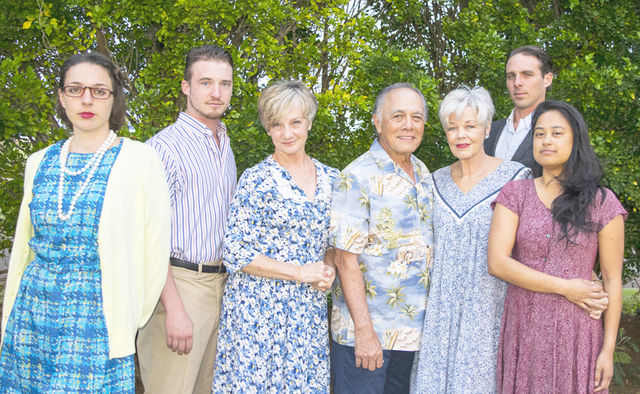LIHUE — David Penhallow-Scott saved the best for last. His four-play saga told the story of plantation life in Hawaii before World War II and the years that followed the bombing of Pearl Harbor. First, there was “Bonzai Darling.” Next
LIHUE — David Penhallow-Scott saved the best for last.
His four-play saga told the story of plantation life in Hawaii before World War II and the years that followed the bombing of Pearl Harbor.
First, there was “Bonzai Darling.” Next came “Emma’s Last Dance” in 2014. The third play was “Matilda’s Waltz” in 2015.
Tonight marks the opening of the final play, “Going Home” at the Puhi Theatrical Warehouse.
Penhallow-Scott, who grew up on Kauai and today lives in Hilo, is proud of it.
“It’s the best one,” he said during a phone interview with The Garden Island. “By the time I got to the fourth play, I learned how to write a play.”
The playwright, today in his early 80s, is modest. He has substantial publications to his credit, including his recent book, “Murder with Aloha at the Coco Palms Hotel,” had a career in theater, taught drama, managed a Kauai resort and was director of the Kauai Museum.
He was a boy on Oahu when Pearl Harbor was bombed on Dec. 7, 1941, which left an impression that remains with him to this day. It’s what influenced his decision to write this four-part story that follows the life of Eudora Whitney and her family.
People have been waiting for this one. This weekend’s shows are all sold out. Every show for “Matilda’s Waltz” sold out in 2015.
“It’s wonderful. You never know if anybody is going to come,” he said.
Penhallow-Scott is pleased with the response to the play described as “exciting, historic, romantic” and one which takes the audience back to 1946 Hawaii.
Going Home, Penhallow-Scott said, is his “’Downton Abbey’ saga.”
“I tried to tie everything back together,” he said. “I always knew how it was going to end. I knew where I was going.”
But surprises await the audience in this finale.
“Nothing appears as it seems,” he said. “Maybe you will jump out of your pants at the end of the play.”
This play follows the time considered the end of an era on Hawaii. The sugar plantation dominance is ending, the war is over and changes to Hawaii are coming.
His protagonist, Eudora Whitney, is coming to terms with her life, just as Penhallow-Scott did his.
Penhallow-Scott himself lived through many changes in Hawaii. He cared for his mother, Anna Sloggett, until she died at age 106.
“Part of this play is for me,” he said. “It’s for all of us, as we get older. There’s no judgment. That’s just the way it is.”
Penhallow-Scott directed the first three plays of the series. This time, he handed directing duties to Steve Whitney, who was in “Matilda’s Waltz” as Whit.
“I killed him off in this play,” Penhallow-Scott said, laughing. “(Whitney) joked and asked, ‘Can’t you bring him back?’”
Whitney has done an outstanding job as director, Penhallow-Scott said. The two went over the script together and are confident the audience will like their collaboration.
“I was wondering how it would work, and it has been wonderful,” he said. “It’s a better play. You get another point of view and it only enriched this play.”
Penhallow-Scott isn’t done writing. In fact, he’s signing copies of his book, “Murder with Aloha at the Coco Palms Hotel” tonight from 6 to 9 at The Bookstore in Hanapepe and at 11 a.m. to noon Saturday at the Kauai Museum.
“I’m going to be 84 and who knows. Maybe I have a lot more plays in me,” he said. “But I couldn’t be more pleased with this play. It’s exciting, the characters are rich, the themes continue on today.”
Penhallow-Scott said for those who have seen all four plays, or even only this one, he wants them to leave the theater “feeling hopeful and full of promise with life.”
“I always want to know that things can get better. What we all want to do, we all want to find our own home within ourselves,” he said. “It takes a long time. It happens in this play.”
“The main thing, or whole search, is going home.”


